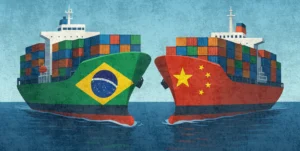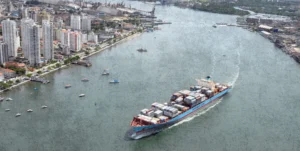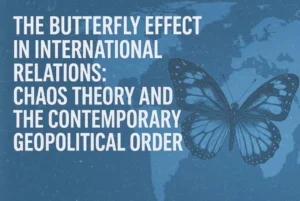This guide highlights the key obstacles and how to overcome...
Read MoreJota's blog
Where global markets, power politics, and international law collide to shape the world order
albatroz
Table of Contents
Between Tariff and Diplomacy
The New Maritime Route and its Impact on Brazil-China Relations
In the current context, the United States has been exerting pressure on the Chinese government through the imposition of new tariffs, while Beijing, in turn, seeks to expand its economic power through diplomacy and the formation of trade partnerships around the world. In response to American pressure on the agreements of the New Silk Road and its subsequent stagnation, Xi Jinping’s government has been strengthening ties and improving import and export logistics operations with Brazil.
Recently, a new maritime route was inaugurated, connecting northeastern Brazil to the Gaolan Port in China. This agreement has several nuances that deserve to be analyzed and interpreted, as it goes beyond the notable boost to trade between these two long-standing trading partners. It represents a significant geopolitical rearrangement in South America, with the potential to benefit not only Brazil but also other South American countries.
Currently, at least five countries use ports in Brazil’s North and Northeast regions to export their goods to China. These countries include:
- Paraguay: exports soybeans, beef, and grains.
- Bolivia: exports minerals, such as zinc and lead, in addition to soybeans.
- Chile: is known for exporting copper and fruits, including grapes.
- Colombia: contributes coffee and coal exports.
- Argentina: focuses on exporting soybean flour and vegetable oils.
In the first quarter of 2024, the Port of Bahia handled US$ 1.2 billion in trade with China and imported US$ 800 million in Chinese products, establishing itself as a strategic hub. With a capacity for ships up to 160,000 tons, the new direct maritime route is expected to reduce transit time by 15% and freight costs by 20%.
The Ministry of Ports and Airports projects the creation of 2,500 direct jobs by the end of 2025 and the attraction of US$ 300 million in investments in renewable energy and logistics, reinforcing the role of the port complex in regional development and trade with China.
How Chinese SMEs Can Benefit
The China-Brazil currency swap agreement offers a strategic advantage for...
Read MoreHow to Start a Company
Each structure has specific tax and legal implications, making professional...
Read MoreThe Butterfly Effect in International
Chaos Theory, with its fundamental principle of the “butterfly effect,”...
Read MoreAbout The Author
Jota Batista is the founder of Albatroz Advisory and the author of this blog. He writes regularly about international business, geopolitics, market entry strategies, and global risk management. Through his articles, Jota shares practical insights for companies looking to expand into Brazil, especially from emerging markets like China, India, and the UAE.
LinkedInEmail-me



